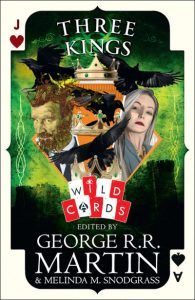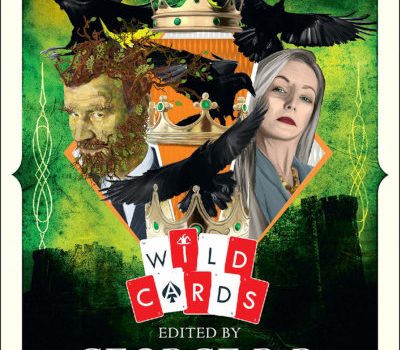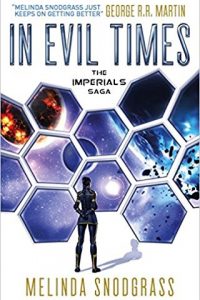Paula Guran Reviews Three Kings, Edited by George R.R. Martin & Melinda M. Snodgrass
 Three Kings, George R.R. Martin & Melinda M. Snodgrass, eds. (HarperVoyager UK 978-0-00-83614-8, £20.00, 560pp, hc) May 2020.
Three Kings, George R.R. Martin & Melinda M. Snodgrass, eds. (HarperVoyager UK 978-0-00-83614-8, £20.00, 560pp, hc) May 2020.
Three Kings is a mosaic novel by five authors: Melinda M. Snodgrass, Peadar Ó Guilín, Mary Anne Mohanraj, Caroline Spector & Peter Newman, published, for now, only in the UK (a US edition from Tor won’t be out for at least a year). It is the 29th volume in the Wild Cards series and is a sequel to Knaves Over Queens. Like its predecessor, Three Kings is set in Great Britain and its aces, jokers, and knaves are English or Irish.
If you are unaware of what Wild Cards is, in brief: created by George R.R. Martin and first published in 1987, the Wild Cards universe departs from ours in 1946 when an alien virus arrives on Earth. Ninety percent of those who contract it die; the DNA of the ten percent who survive it is altered. Nine percent acquire debilitating mutations and become known as jokers. The remaining one percent, aces, gain unique superpowers. There’s also an uncounted number of those dealt a mixed hand: joker-aces. In Knaves Over Queens they acquired a new nickname – “knaves.”
Three Kings takes up in 2017 where Knaves Over Queens left off: just as Queen Margaret (Elizabeth II’s successor) is about to die. On her deathbed, she tells trusted joker-ace Alan Turing (AKA Enigma) he must find a secret heir, Elizabeth’s son. Born a joker, the baby had been hidden away at birth. Even Margaret feels her eldest son and heir – Henry, a rigid “Britain First” bigot – is ill-suited to the throne. Her second son, Richard, is a better person and more popular than his brother, but still not king material. Turing – who served King George and his daughter Queen Elizabeth with loyalty, and is especially devoted to Queen Margaret – listens but cannot fathom how an unknown contender could emerge and take precedence over Margaret’s sons.
The heirless new ruler, 71-year-old King Henry IX, quickly marries a woman young enough to be his granddaughter and declares he wants Britain to be “Anglo-Saxon” again. There’s no room for “freaks” like jokers. Violence against jokers (and immigrants) immediately increases.
Meanwhile, Richard, Duke of York, a decent chap who is secretly gay, despite having a bevy of children, wouldn’t mind being King Richard IV. Alan Turing, who had a relationship with Richard in the past, ponders backing him in a bid to take the throne. But he, and others, feel they must find the lost heir.
Shades of York and Lancaster! Other than superpowers and altered humans, there’s nothing here that can’t be found in English history. In the 21st century, kings and queens may no longer possess real power, but a throne is still worth fighting over. As in real life, the British monarchy is unlikely to be abolished. As the novel expresses: Britain wouldn’t be Britain without royals.
Enigma, Green Man, Double Helix, Seamstress, Badb, the Lion, Wayfarer, and other aces and jokers introduced in Knaves Over Queens return in Three Kings. Unlike the previous book, which covered 1946 to 2017 in separate short stories, the action here occurs in only two weeks.
The plot rolls along briskly and offers some twists: searches for the heir, civil and military unrest, chaos sown by the goddess of war, violence from joker extremists the Twisted Fists, a surprise identity for Elizabeth’s child, another pretender, an abduction, no politics, some romance, and plenty of tea drinking.
Mosaic novels can be tricky; authorial differences that add so much can also detract. It takes a steady editorial hand to make it all work. Melinda M. Snodgrass (publicly acknowledged by “co-editor” George R.R. Martin, and on the title page if not the cover, as the primary editor of this volume) deserves note for making this mosaic a cohesive whole.
Although it helps to have read Knaves Over Queens, the reader can appreciate Three Kings without having done so. Like Knaves Over Queens, readers who are Anglophiles and/or natives of the UK may like Three Kings better than US fans who want more about jokers and aces they already know. Even without any previous Wild Cards orientation, Three Kings is an entertaining read.
Paula Guran has edited more than 40 science fiction, fantasy, and horror anthologies and more than 50 novels and collections featuring the same. She’s reviewed and written articles for dozens of publications. She lives in Akron, Ohio, near enough to her grandchildren to frequently be indulgent.
This review and more like it in the September 2020 issue of Locus.
 While you are here, please take a moment to support Locus with a one-time or recurring donation. We rely on reader donations to keep the magazine and site going, and would like to keep the site paywall free, but WE NEED YOUR FINANCIAL SUPPORT to continue quality coverage of the science fiction and fantasy field.
While you are here, please take a moment to support Locus with a one-time or recurring donation. We rely on reader donations to keep the magazine and site going, and would like to keep the site paywall free, but WE NEED YOUR FINANCIAL SUPPORT to continue quality coverage of the science fiction and fantasy field.
©Locus Magazine. Copyrighted material may not be republished without permission of LSFF.







